email from Michael 11 November 2006:
Things went really well with Exile Theatre in Kabul. We met with Shafiq, Zia, and Jamil and they were very interested in our description of the India project so far. We also met with the Indian Embassy here in hopes of easing Exile Theatre's future visa application. We visited our friends at Kabul University (they really need more faculty) , and had a very good chat with the Aga Kahn Foundation.
We got a lot of great advice and we may have laid some important groundwork for the months to come.
Less than a week to go!! Now it's back to INDIA!

Bond Street Theatre serves refugee populations and communities affected by conflict by utilizing the arts as a pathway to peace and prosperity. We provide joy and laughter, educational enrichment, trauma relief, and cultural stimulation through our arts-based programming. The company is a non-profit NGO in association with the UN-DPI and has worked in a myriad of critical regions worldwide.
Thursday, November 16, 2006
back to Afghanistan...briefly
From an email from Joanna 8 November 2006:
We have been meeting amazing people and organizations and seeing such great programs. Spent six days with Banglanatak in Calcutta and they are really fantastic! We are coming back with a lot of DVDs of their work! We had a great meeting of a a director and his students in his country side studio. It was this cool little space with 360 degree view to the farm fields beyond. No electric but a nifty space to work during the days. We hope to use this space when we return.
We were unable to secure visas for the Exile Theatre team, who need an official letter of invitation to join us in India. So far it has proved too hard to successfully traverse all of the official nuances that involve official papers, willing hosting organizations, and speed. So, we have decided to make a quick trip to Kabul to meet with Exile, and to solidify our plans and intentions with Kabul University. We have to tell the University that we will most certainly repay their kindness over the last four years and come back to work with their actors, but in the meantime we hope one of their actors will want to join us on this India project. We will also meet with Gul Makeshah of the Kabul National Theatre while we are there, and the FCCS (the French cultural organization).
All the groups we've met with are totally into our coming. Pravah wants us to help them setup their Theatre In Development Program, the salaam baalak trust is doing this amazing work with the street kids by the RR station, and we will be visiting the Islamic universities (Jamia Millia and Aligargh) in the next two weeks. Maybe one of their students will join our team too!
We must continue to write for support for going to Afghanistan. A few letters showed dismay and a belief that we were giving up on Afghanistan. I had to write them right away and say - No! We are going to come back! We're just doing something in India TOO!
We're excited about doing tandem programs in both neighboring countries, and hope that we can take what we learn in India and bring it to Afghanistan. How perfect would that be !?!
We have been meeting amazing people and organizations and seeing such great programs. Spent six days with Banglanatak in Calcutta and they are really fantastic! We are coming back with a lot of DVDs of their work! We had a great meeting of a a director and his students in his country side studio. It was this cool little space with 360 degree view to the farm fields beyond. No electric but a nifty space to work during the days. We hope to use this space when we return.
We were unable to secure visas for the Exile Theatre team, who need an official letter of invitation to join us in India. So far it has proved too hard to successfully traverse all of the official nuances that involve official papers, willing hosting organizations, and speed. So, we have decided to make a quick trip to Kabul to meet with Exile, and to solidify our plans and intentions with Kabul University. We have to tell the University that we will most certainly repay their kindness over the last four years and come back to work with their actors, but in the meantime we hope one of their actors will want to join us on this India project. We will also meet with Gul Makeshah of the Kabul National Theatre while we are there, and the FCCS (the French cultural organization).
All the groups we've met with are totally into our coming. Pravah wants us to help them setup their Theatre In Development Program, the salaam baalak trust is doing this amazing work with the street kids by the RR station, and we will be visiting the Islamic universities (Jamia Millia and Aligargh) in the next two weeks. Maybe one of their students will join our team too!
We must continue to write for support for going to Afghanistan. A few letters showed dismay and a belief that we were giving up on Afghanistan. I had to write them right away and say - No! We are going to come back! We're just doing something in India TOO!
We're excited about doing tandem programs in both neighboring countries, and hope that we can take what we learn in India and bring it to Afghanistan. How perfect would that be !?!
Holy Cow! BST in INDIA
From an email from Michael 7 November 2006
Greetings my many friends from Delhi, India. I have some time in the internet cafe so I have composed some thoughtson our trip thus far.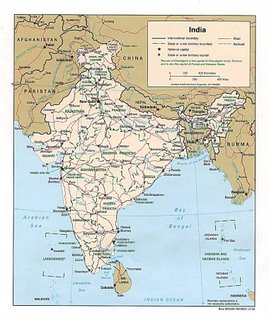 I realize some of you may be surprised to hear from us in Delhi, India, but I suspect you have come to suspect this kind of thing of us by now.
I realize some of you may be surprised to hear from us in Delhi, India, but I suspect you have come to suspect this kind of thing of us by now.
My expectations of India were totally informed by my 4th grade social studies class, so all this time I am expecting Maharajahs riding elephants, thousands of beggars roaming the streets, and slinky Bollywood starlets going in and out of technicolor temples to gods with 16 arms and legs. But as our plane lands and we taxi into Delhi I find:New York City, with no blonds. No elephants, no starlets, no beggars-- a few, but not so bad. What a let down. But it is Delhi, and we were hanging in the biz sections, buying a cellphone and meeting Embassy and NGO types.
But Calcutta-- or Kolkatta as it is now spelled-- that is more like India! Still no elephants, but they got some cows. They are quick to say that they are Bengalies (like New Yorkers saying we are New Yorkers-- its not to be confused with American!). So this is going to be home for the project.
 There is one NGO, Banglanatak, promoting street theatre for social good. It is, get this, run almost entirely by university trained engineers. The leader gave up a profitable software career in Silicone Valley to return to native Kolkatta to set up an organization that gets contracts from NGO's that want to reach the masses, say with an AIDS awareness campaign. They go into the town or district, identify the issues and the environment, and hire the local theatre company to do short theatre pieces on the topic. If there is no local company they form one.The idea is that the positive message comes from artists that live in the community. And if they can also mix in local theatrical traditions all the better.
There is one NGO, Banglanatak, promoting street theatre for social good. It is, get this, run almost entirely by university trained engineers. The leader gave up a profitable software career in Silicone Valley to return to native Kolkatta to set up an organization that gets contracts from NGO's that want to reach the masses, say with an AIDS awareness campaign. They go into the town or district, identify the issues and the environment, and hire the local theatre company to do short theatre pieces on the topic. If there is no local company they form one.The idea is that the positive message comes from artists that live in the community. And if they can also mix in local theatrical traditions all the better.
It's hard to believe, but in one district in one province of West Bengal alone, Amitava claims there are 640 street theatre companies . Just street theatre. And they've been forming more. The idea is that the local organizations can continue to use the local groups and their techniques to get more information to the masses. And it becomes a job. Mind you, this is what we are told, but I am pretty interested in getting more of the story when we return next year.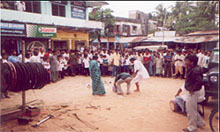
There are some NGO's we could partner with in Delhi as well, working with street children around the train station. In addition to basic literacy programs and health attention they teach the kids theatre techniques to build self esteem and also perform social issues. Their theatre director is a former street kid himself.
These are some of the findings so far. Still have a bit more time to go. Will be back in NY on the 19th. God, this is exhausting work, and we haven't even touched our toes yet.
Hope all is well with you all in your worlds.
Much love, Michael and Joanna
Greetings my many friends from Delhi, India. I have some time in the internet cafe so I have composed some thoughtson our trip thus far.
 I realize some of you may be surprised to hear from us in Delhi, India, but I suspect you have come to suspect this kind of thing of us by now.
I realize some of you may be surprised to hear from us in Delhi, India, but I suspect you have come to suspect this kind of thing of us by now.My expectations of India were totally informed by my 4th grade social studies class, so all this time I am expecting Maharajahs riding elephants, thousands of beggars roaming the streets, and slinky Bollywood starlets going in and out of technicolor temples to gods with 16 arms and legs. But as our plane lands and we taxi into Delhi I find:New York City, with no blonds. No elephants, no starlets, no beggars-- a few, but not so bad. What a let down. But it is Delhi, and we were hanging in the biz sections, buying a cellphone and meeting Embassy and NGO types.
But Calcutta-- or Kolkatta as it is now spelled-- that is more like India! Still no elephants, but they got some cows. They are quick to say that they are Bengalies (like New Yorkers saying we are New Yorkers-- its not to be confused with American!). So this is going to be home for the project.
 There is one NGO, Banglanatak, promoting street theatre for social good. It is, get this, run almost entirely by university trained engineers. The leader gave up a profitable software career in Silicone Valley to return to native Kolkatta to set up an organization that gets contracts from NGO's that want to reach the masses, say with an AIDS awareness campaign. They go into the town or district, identify the issues and the environment, and hire the local theatre company to do short theatre pieces on the topic. If there is no local company they form one.The idea is that the positive message comes from artists that live in the community. And if they can also mix in local theatrical traditions all the better.
There is one NGO, Banglanatak, promoting street theatre for social good. It is, get this, run almost entirely by university trained engineers. The leader gave up a profitable software career in Silicone Valley to return to native Kolkatta to set up an organization that gets contracts from NGO's that want to reach the masses, say with an AIDS awareness campaign. They go into the town or district, identify the issues and the environment, and hire the local theatre company to do short theatre pieces on the topic. If there is no local company they form one.The idea is that the positive message comes from artists that live in the community. And if they can also mix in local theatrical traditions all the better.It's hard to believe, but in one district in one province of West Bengal alone, Amitava claims there are 640 street theatre companies . Just street theatre. And they've been forming more. The idea is that the local organizations can continue to use the local groups and their techniques to get more information to the masses. And it becomes a job. Mind you, this is what we are told, but I am pretty interested in getting more of the story when we return next year.

There are some NGO's we could partner with in Delhi as well, working with street children around the train station. In addition to basic literacy programs and health attention they teach the kids theatre techniques to build self esteem and also perform social issues. Their theatre director is a former street kid himself.
These are some of the findings so far. Still have a bit more time to go. Will be back in NY on the 19th. God, this is exhausting work, and we haven't even touched our toes yet.
Hope all is well with you all in your worlds.
Much love, Michael and Joanna
Thursday, September 14, 2006
Performing Artist for Balkan Peace: Mostar 2006:
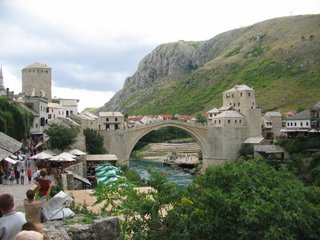 Mostar, BOSNIA and HERZEGOVINA: August 2006: As many of you know we have recently returned from the second meeting of Performing Artist for Balkan Peace. Once again we came together with artists from across the Balkans and Eastern Europe to share our artistry, vision, frustrations, and hopes. The experience was, in a word, inspirational.
Mostar, BOSNIA and HERZEGOVINA: August 2006: As many of you know we have recently returned from the second meeting of Performing Artist for Balkan Peace. Once again we came together with artists from across the Balkans and Eastern Europe to share our artistry, vision, frustrations, and hopes. The experience was, in a word, inspirational.Our original idea was to create a sustainable and expandable network of performing artists devoted to cross-border collaboration, social progress and peace. In 2005, we met in Bulgaria and worked closely together, sharing techniques, discussing the issues facing the Balkans, improvising on these themes, and collaborating in crafting the final production of Honey and Blood. Through the process of co-creation we had all given birth to the same child and we had now returned to see it grow. It was with the greatest pleasure and camaraderie that we began our second collaboration.
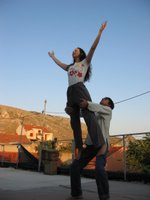
We had seven days to reconstruct Honey and Blood as the opening performance of Mostar Youth Theatre’s Festival of Authorial Poetics, an annual festival that attracts students and professionals from around the world for an intensive series of workshops and performances. Our plan was that this environment would offer the best opportunity to introduce the PABP to an international community. Through that first week, we were amazed at our creative ease as a group as we re-discovered our way of working together. Honey and Blood opened the Festival with a positive response from an eager crowd and many stayed afterwards to discuss our collaboration in more detail. We encouraged the artists to join the PABP over the next week for the second phase of our project: creating a site-specific work which would transform destroyed sites around the city into performance spaces, celebrate the city of Mostar, and reflect on local issues and those facing the region.
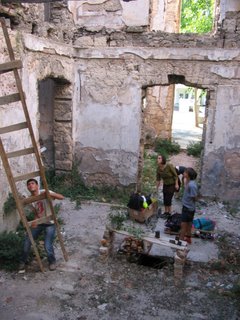 The City of Mostar is a dramatic and inspiring backdrop for site-specific work, a place of visual contradictions. ten years after the war, the scars of war are still highly visible to locals and strangers alike. Exoskeletons of bombed buildings riddled with bullet holes and broken glass still stand in central locations throughout the town next door to renovated modern buildings. We used the destruction to draw our creative impulses. With the help of Mostar Youth Theatre, we picked three sites and the directors decided to work in pairs to heighten the collaborative experience for them. We decided to connect the three performances with a pageant or parade from one site to another which would gather passers-by and involve the town even more directly.
The City of Mostar is a dramatic and inspiring backdrop for site-specific work, a place of visual contradictions. ten years after the war, the scars of war are still highly visible to locals and strangers alike. Exoskeletons of bombed buildings riddled with bullet holes and broken glass still stand in central locations throughout the town next door to renovated modern buildings. We used the destruction to draw our creative impulses. With the help of Mostar Youth Theatre, we picked three sites and the directors decided to work in pairs to heighten the collaborative experience for them. We decided to connect the three performances with a pageant or parade from one site to another which would gather passers-by and involve the town even more directly. We had five days to complete this work, a hurried but fruitful process. The three groups worked separately during the day and re-convened in the evenings to share daily discoveries. Each group immediately found their distinct style of working, influenced by the unique choice of actors and theatrical backgrounds, but mostly inspired by the space that t
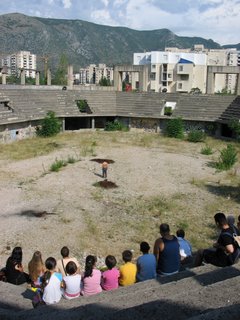 hey had chosen. We all used resources found on location and little else. The groups realized that this site-specific work was very useful in that it mimicked the conditions we find in our outreach work in refugee camps, prisons, orphanages – that is, few resources.
hey had chosen. We all used resources found on location and little else. The groups realized that this site-specific work was very useful in that it mimicked the conditions we find in our outreach work in refugee camps, prisons, orphanages – that is, few resources.We decided that annual meetings are desirable even if the entire membership is not present, and that this will provide the opportunity to introduce new groups into the mix. We also plan to include a community outreach component as a commitment to our shared mission of social progress. Our plan for 2007 is to meet in the newly renovated Theatre Dodona in Pristina, Kosovo, a heroic theatre during the war, and also to work with a youth center in the still-volatile town of Mitrovica.
Subscribe to:
Comments (Atom)